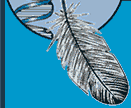
|
Reviews of the Leech and the Earthworm
|
Pequot Times (September 2003, p.
10)
Blood for Money
By Trace A. DeMeyer
When was the last time you gave blood for a research study?
Ever wondered if genetic research is being done on Indigenous people?
Absolutely and often without their knowledge. The film "The Leech
and the Earthworm" chronicles the new Columbus - a genetic scientist
who wants to map your genetic identity, and will even steal to get it.
Filmed on location in New Zealand, Vanuatu, British Columbia, the
US, and Johannesburg, the film explores the Indigenous view on Western
science and its links with colonization, globalization and corporate
"patent" profits.
Debra Harry, (No. Paiute), Executive Director of the Indigenous Peoples
Council on Biocolonialism is the visionary, the messenger and the producer
of the film. Harry partnered with London-based directors Max Pugh and
Mark Silver of Yeast Directions to make this shocking and powerful 68
minute film
One interview that stands out is with Larry Baird, leader of the Nuu-chah-nulth
Tribe of Vancouver Island, Canada, who was outraged to find out that
DNA samples taken from over 800 tribal members almost 20 years ago for
arthritis research were taken toOxford and used for other purposes without
their consent.
Harry explained her reason for making the film, "We are able
to share the thoughtful analysis of Indigenous leaders from around the
world. The narratives are not only articulate critiques on genetic engineering,
but the speakers also advocate for self-determination, the protection
of traditional knowledge, and for the continuation of indigenous life
ways and worldviews."
The film uses effective collage, musical scoring, archive footage and
graphics to creatively trace more than 100 years of alarming abuse and
wisely argues for an alternative worldview based on collaboration and
Indigenous wisdoms.
Some interviews on film include:
Angeline Greensill, Maori attorney from Hamilton, Aotearoa
(NZ), and her legal efforts to block human-cow transgenic field trials
being conducted by Ag Research, and to mobilize anti-GE activism among
Maori communities throughout NZ.
Chief Viraleo of the Turaga Nation of Pentacoste Island,Vanuatu,
and his 20 years of successful efforts to revitalize the traditional
ways of life in the remote villages ofPentacoste Island, in order to
insure his people are healthy and their island is used in a sustainable
manner. His communities have chosen to reject Western medicine and other
influences of Western society.
Vickie Tauli-Corpuz, of the Igarot Nation, and Executive Director
of the Tebtebba Foundation based in the Phillipines, interviewed on
location in Johannesburg during the UN World Summit on Sustainable Development
on the new global trade agreements and their impact on indigenous peoples.
The film has already been screened for global audiences in London,Slovenia,
in Nadi and Suva,Fiji, five venues in Aotearoa (New Zealand), and atCornell
University,San Franciscoand the UN Permanent Forum on Indigenous Issues
in theUS. It was also shown at the Native American Journalists Association
conference in Green Bay in June.
The filmmakers are now seeking distributors to make the film available
to a worldwide audience, and perhaps for television broadcast. They
hope to produce a DVD version with accompanying study guide, and eventually
make the film available in different languages. The film will be submitted
to various film festivals.
Genetic theft is not going to go away anytime soon. Indigenous peoples
are still vulnerable to this new exploitation without information.
This film will open your eyes. Do your best to go see it. |







